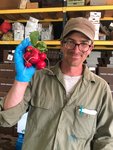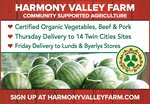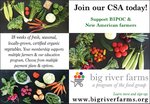




Just what is a CSA?
“A CSA (Community Supported Agriculture) is a direct partnership between consumers and local producers,” explained Abby Rogosheske of Seward Co-op. “A consumer becomes a member of a CSA by purchasing a share in a farm’s harvest, which helps cover that farm’s yearly operating costs. In return for that investment, members receive fresh produce or other goods – delivered to specific drop sites in the Twin Cities (including Seward Co-op locations).”
Harmony Valley Farm in Viroqua, Wis. is celebrating its 30th anniversary this year. “While CSA stands for ‘Community Supported Agriculture,’ it could also stand for ‘Community Sustained Agriculture,’” observed Andrea Yoder of Harmony Valley Farm.
“It truly is a way for a farmer and an eater to form a mutually beneficial relationship in which both parties reap the benefits. Plus, learning to eat with the seasons, spending time preparing food and sharing it with others helps to feed not only the body but the soul, as well.
“It’s simply a more meaningful way to eat.”
In addition to providing food, some CSAs offer training programs and are incubators for small farmers, like Big River Farms in Marine on St. Croix. Through its Farmer Education Program, participants are exposed to the realities of running an independent farm; not just the work of producing food, but the details of running a successful business. It is a primary goal of the program to encourage farmers to think realistically about the feasibility of running and owning their own farm operation, and ultimately build the skills necessary to run successful small farm enterprises upon graduation, according to their website. These farmers contribute to the Big River Farms CSA program, offer their own CSAs, and sell produce at farmers markets.
Big River Farms focuses its land-based training program on supporting immigrant and BIPOC (Black, Indigenous, people of color) farmers, populations that generally have difficulty accessing the resources needed to establish a successful farm business.
Big River Farms is a program of the Food Group, which hosts the annual Emerging Farmers Conference.
Q&A with a farmer
Harmony Valley is a family farm run by co-owners Richard de Wilde, Andrea Yoder and Rafael Morales, along with a crew that varies with the seasons from 15-60 team members. The home farm consists of 200 acres of woods, pastures and crop land lying along Spring Creek in Viroqua, Wis. They sell produce and meat through a 1,500-member CSA, a weekly stall at the Dane County Farmers Market, retail grocers and wholesale distributors.
Their CSA membership more than doubled in the spring of 2020 when the COVID-19 pandemic hit, and their retention remained strong in 2021. Yoder isn’t sure what 2022 will look like yet but know they remain committed to delicious, organic food.
Why get a CSA?
Yoder: The thing that varies with CSA versus buying your vegetables at a grocery store or food co-op is that you get more than just a box of vegetables. You also get connection to the place where your food is grown and the people who grow it. This type of connection allows for transparency and a more secure supply of food as there are no middle men or a long and complicated supply chain to get the food from its origin to your table. Eating from a CSA box is a great way to support regional/local producers and keep your food dollars in the local economy. Short of growing your own food, it’s one of the best ways to get fresh, nutrient dense vegetables. Plus, it’s a lot of fun to eat with the seasons and many of our customers tell us it’s like Christmas every time they open a box!
What are the benefits of a CSA?
Yoder: In addition to the points I mentioned above, many people find they eat more vegetables when they participate in CSA simply because they are in their refrigerator! Many of our customers also appreciate the wide diversity of vegetables they eat during the CSA season and find there are things they maybe wouldn’t select on their own but when they try it, they find out they really like it. We’ve had some of our customers tell us they consider their CSA box to be their health insurance policy. They’d rather invest in healthy vegetables and reap the health benefits of eating high quality, nutritious food than invest their money in healthcare when they get sick. CSA is also a great way to introduce children to the way real food tastes, expand their palates and allow them to experience a wide variety of flavors and textures while also connecting them to nature.
CSA is a way that each individual can be part of creating a sustainable local food supply chain. Every time we make a purchase, we’re supporting something. When you choose to purchase a CSA your dollars stay in the local community, but your purchase also allows you to support practices that are in alignment with your personal beliefs and values. Some of these values may include supporting a food system where workers are respected and are paid a fair and living wage. Perhaps you want to support regenerative farming practices that contribute in positive ways to mitigating climate change or you want your food dollars to support farms that invest in providing habitat in their growing areas for pollinators.
What sets your CSA apart?
Yoder: There are several things that set our CSA apart from others. First, we are experienced growers and 2022 will be our 30th year of growing for CSA. We have learned a lot over the years and are able to reliably grow a wide variety of vegetables over the course of a 30-week delivery season from May-December. We also provide our customers with a variety of resources with each delivery to help them find success with every box. These resources include a weekly newsletter that highlights new vegetables, offers storage and preparation information, and updates from the farm. I am also a professional chef, and provide feature recipes every week that are simple and delicious. Additionally, we post a “Cooking With the Box” article on our blog every week that provides links to recipes from a wide variety of sources to help guide members/customers in finding ways to use their vegetables.
Q&A with CSA Fair organizer
For the past 21 years, Seward Co-op has hosted a CSA Fair in the spring. Attendees online and in person learn about a variety of different CSAs, which offer vegetables and fruit, meat, cheese, bread, mushrooms, herbs and more. Some farms also offer add-ons like honey, maple syrup, eggs and flowers. Others allow CSA shares to be customized with various options to fit your needs, including half shares, and weekly purchase options.
This year’s CSA Fair will be held Saturday, April 23, 2022, and include a celebration of the co-op’s 50th anniversary.
“Hear from farmers, producers and other community partners about Seward Co-op’s impact over the past decades,” said organizer Abby Rogosheske. “And like always, you’ll have the opportunity to learn about our local farms and speak directly with nearly 30 farmers to choose a CSA share that is right for you and your family. We’ll have treats, prizes, and kids activities with Midwest Food Connection as we celebrate.”
What are the benefits of a CSA?
Rogosheske: Some people choose to purchase a CSA because it’s a great value for the amount of produce you receive. Others appreciate the direct relationship with a grower, the fun variety of produce or the chance to support our local food system.
Why might a co-op member also want a CSA?
Rogosheske: In some ways we might be taking business away from the co-op by promoting CSA membership. But as a community cooperative, we understand that co-ops and small-scale CSAs are working toward the same goal: a food system grounded in our local economy that truly nourishes and meets the needs of everyone in our community. And on a practical level, a CSA is a great excuse to introduce yourself to new ingredients and recipes that might inspire your shopping trips at the co-op year-round! And even if all of your needs are met at the co-op, many farms these past few years have added a mutual aid option, allowing you to donate funds or a CSA share to community members in need.
How do CSAs contribute to our local food system?
Rogosheske: Becoming a member of a CSA is a great way to support small, local growers because you are purchasing the harvest upfront. Many farmers share that this provides needed capital investment as the growing season starts. In other words, when you purchase a CSA, you’re not just a consumer of local food – you are an investor in our local food system. In some ways, this is similar to becoming a member-owner of Seward Co-op – when you do this, you are investing in the co-op; you’re an owner, not just a shopper.
What tips do you offer folks?
Rogosheske: These last few years, we’ve added a virtual component to our annual CSA Fair (at first it was out of necessity, due to the pandemic, but it’s been so popular that we are continuing the “virtual fair” even though we are also planning an in-person event). As part of this, we offer a really helpful guide that includes our full list of CSA Fair participants, with information on the type of CSA, drop-off locations, and price range. Farmers also share video introductions. This is a great way to “shop around” ahead of time – and then you’ll have a chance to chat face-to-face with farmers at the in-person event on April 23!
Comments
No comments on this item Please log in to comment by clicking here